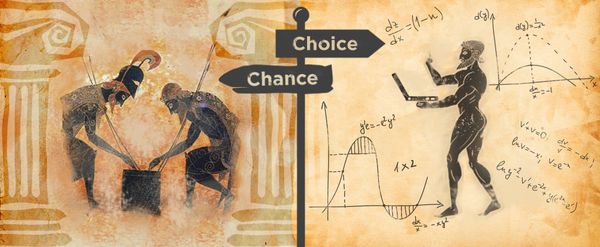Gambling is one of the world’s oldest pastimes. Having started as entertainment back in the ancient times, betting outcomes were perceived as no more than a whim of the gods. Gambling has now transformed to the most extraordinary way to bring home the bacon. The story of that transformation is both interesting and relevant to all aspiring professional bettors.

In the US alone revenues from land based casinos and lotteries amounted to $57 billion in 2006, far exceeding the $20 billion for movie tickets and music recordings and the $28 billion in sales from McDonalds, Burger King, Wendy’s, and Starbucks combined.
Despite this, gambling is often frowned upon. By the end of the article you will get an idea of why this is the case, as well as of what distinguishes a gambler from a smart bettor.
At the beginning was chance
The earliest recorded form of gambling that has ever taken place in human history is believed to date back to ancient China around 2300 BC. It wasn’t all about entertainment though. Evidence points to the dice having been used to decide the fate of territories. The same was also the case in Europe. Back in 100 AD, the dispute over the District of Hising between the King Olaf of Norway and King Olaf of Sweden was resolved in favour of the Swedish king, when he rolled double sixies back to back. (1/36 chance)
Gambling was seen as a metaphor for life. Pliny the Elder famously wrote during the 1st century: “We are so much at the mercy of chance that Chance is our god.”
When it comes to betting on the outcome of sporting events, the credit goes to the Greeks, home of the Olympic Games. Thousands of years ago, athletic competitions, such as footrace and hurling the discus, were held in various cities with prize money bestowed on the winners. However, it was at the viewing stands of these events where the big money was made, with entire estates being wagered.
Even bigger sports bettors were the Early Romans, with heavy betting leading not only to losing their material possessions but even their freedom. From dice and knucklebones to board games and chariot races, in Rome all was fair; including the use of “magical” lead tablets with the aim to inflict bad luck and even death upon the rival.
Gambling was seen as a metaphor for life. Roman philosopher, Pliny the Elder, famously wrote during the 1stcentury: “We are so much at the mercy of chance that Chance is our god.”
Let there be light
It wasn’t until the Renaissance that risk was scientifically studied, leading to the breakthrough into the fascinating world of probability, the basis of modern risk management used by bookmakers and professional bettors.
The Renaissance was a time of religious turmoil, extraordinary innovation and a vigorous approach to science that put mysticism on the run. In 1654, Chevalier de Mere, a French nobleman with a taste for gambling and mathematics, challenged the famous mathematician Blaise Pascal to solve the puzzle posed by monk Luca Paccioli about two hundred years earlier. The puzzle had turned into a riddle for mathematicians who remained unable to solve it. Pascal consulted Pierre de Fermat for advice, a lawyer and mathematician.
The result of their combined efforts marked the beginning of the end for superstition in risk-taking. What looks like a 17th century version of the game Trivial Pursuit is what led to the discovery of the theory of probability, the mathematical basis for the concept of risk management.
Over the years mathematicians transformed probability theory from a gambler’s toy into a powerful tool for organising, analysing and applying information; valuable quantitative techniques that we now use in all aspects of modern life, from opinion polling and stock picking to wine tasting and drug testing.
Gambling or smart betting? It’s your choice!
“Risk comes from not knowing what you are doing” Warren Buffet, self-made American billionaire investor
The Merriam-Webster dictionary defines risk as “the possibility that something bad or unpleasant will happen”. The American self-made billionaire Warren Buffet has famously stated “risk comes from not knowing what you are doing”.
Looking at risk from an etymological point of view, it derives from the early Italian rischiare, meaning “to dare”. In this sense, risk is a choice rather than fate.
If we are to trust the advice of the successful investor, then the actions we dare to take are directly proportional to the knowledge we posses. As such, success is not a matter of chance, it’s a matter of choice, at least for those who choose to channel the human passion for wagering into profit making.
MORE: TOP 100 Online Bookmakers >>>
MORE: TOP 20 Bookmakers that accept U.S. players >>>
MORE: TOP 20 Bookmakers that accept Cryptocurrency >>>
Source: pinnacle.com
